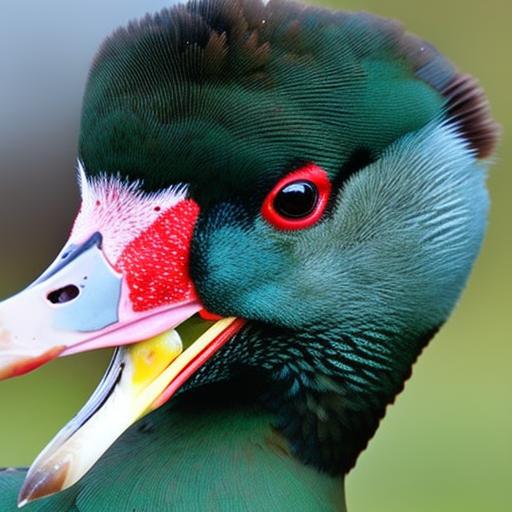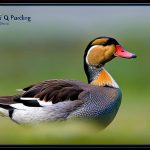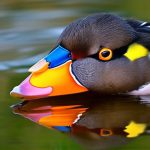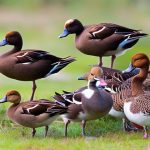Muscovy ducks, scientifically known as Cairina moschata, are a unique breed of domesticated ducks that are popular among farmers and backyard enthusiasts. They are native to South America and have been domesticated for centuries. Muscovy ducks are known for their large size, distinctive appearance, and gentle temperament. They are highly valued for their meat and eggs, making them a popular choice for those looking to raise poultry for food production.
Muscovy ducks are known for their adaptability and ability to thrive in various climates. They are also known for their ability to control pests, such as flies and mosquitoes, making them a valuable addition to any farm or backyard. Additionally, Muscovy ducks are relatively low maintenance compared to other poultry breeds, making them an attractive option for those who may be new to raising ducks.
Key Takeaways
- Muscovy ducks are a unique breed of domesticated duck that originated in South America.
- They are known for their distinctive appearance, including a red, warty face and a large, muscular body.
- Muscovy ducks are popular around the world for their meat and eggs, as well as their ability to control pests and weeds.
- While they can make good pets, they require a lot of space and can be noisy and messy.
- Proper care and maintenance, including regular health checks, are essential for keeping Muscovy ducks healthy and happy.
History and Origin of Muscovy Duck Breeds
The origin of Muscovy ducks can be traced back to South America, specifically the Amazon region. They were first domesticated by indigenous people in this area thousands of years ago. The indigenous people of the Amazon used Muscovy ducks for their meat and feathers, as well as for pest control.
Muscovy ducks were introduced to different parts of the world through trade and exploration. European explorers brought Muscovy ducks back to Europe in the 16th century, where they quickly gained popularity among farmers and breeders. From Europe, Muscovy ducks were further spread to other parts of the world, including North America and Asia.
Over time, Muscovy duck breeds have evolved and diversified. Different breeding programs have resulted in various color patterns and physical characteristics among Muscovy ducks. Today, there are several recognized breeds of Muscovy ducks found around the world.
Physical Characteristics of Muscovy Ducks
Muscovy ducks are known for their large size and distinctive appearance. They are one of the largest breeds of domesticated ducks, with males weighing between 8-15 pounds and females weighing between 5-8 pounds. Their size makes them an excellent choice for meat production.
One of the most unique physical features of Muscovy ducks is their red, fleshy caruncles on their face and around their eyes. These caruncles are more prominent in males and are used for display during courtship rituals. Muscovy ducks also have a distinctive crest of feathers on their head, which can be raised or lowered depending on their mood.
In terms of color, Muscovy ducks come in a variety of patterns and shades. The most common color pattern is black and white, but there are also solid black, solid white, and various other color combinations. The feathers of Muscovy ducks are also unique in that they do not produce the oily coating that other duck breeds have, making them less waterproof.
Popular Muscovy Duck Breeds Around the World
There are several different breeds of Muscovy ducks found around the world, each with its own unique characteristics. Some popular breeds include:
1. Black Muscovy Ducks: This breed is known for its solid black plumage and distinctive red caruncles. They are highly valued for their meat production.
2. White Muscovy Ducks: As the name suggests, this breed has pure white plumage. They are often bred for exhibition purposes but can also be raised for meat production.
3. Blue Muscovy Ducks: This breed has a bluish-gray plumage, which gives them a unique appearance. They are often bred for exhibition purposes.
4. Chocolate Muscovy Ducks: This breed has a rich chocolate brown plumage, which is highly sought after for its unique coloration.
5. Barred Muscovy Ducks: This breed has a striking black and white barred pattern on its feathers. They are often bred for their unique appearance.
Each breed of Muscovy duck has its own unique characteristics and is suited for different purposes. Some breeds are better suited for meat production, while others are bred for exhibition purposes or as pets.
Muscovy Duck Breeding and Reproduction
Breeding Muscovy ducks is relatively straightforward, and they are known for their high fertility rates. To breed Muscovy ducks, it is important to have a ratio of one male to three to five females to ensure successful mating.
Muscovy ducks are known for their unique breeding behavior. Unlike other duck breeds, Muscovy ducks do not quack but instead make a hissing sound. During the breeding season, males will puff up their feathers, raise their crest, and display their caruncles to attract females.
Once a male and female have mated, the female will lay a clutch of eggs in a nest she has built. The incubation period for Muscovy duck eggs is approximately 35 days. During this time, the female will diligently sit on the eggs to keep them warm and ensure proper development.
When the eggs hatch, the ducklings are precocial, which means they are able to walk and feed themselves shortly after hatching. However, it is important to provide them with a safe and warm environment to ensure their survival.
Muscovy Ducks as Meat and Egg Producers
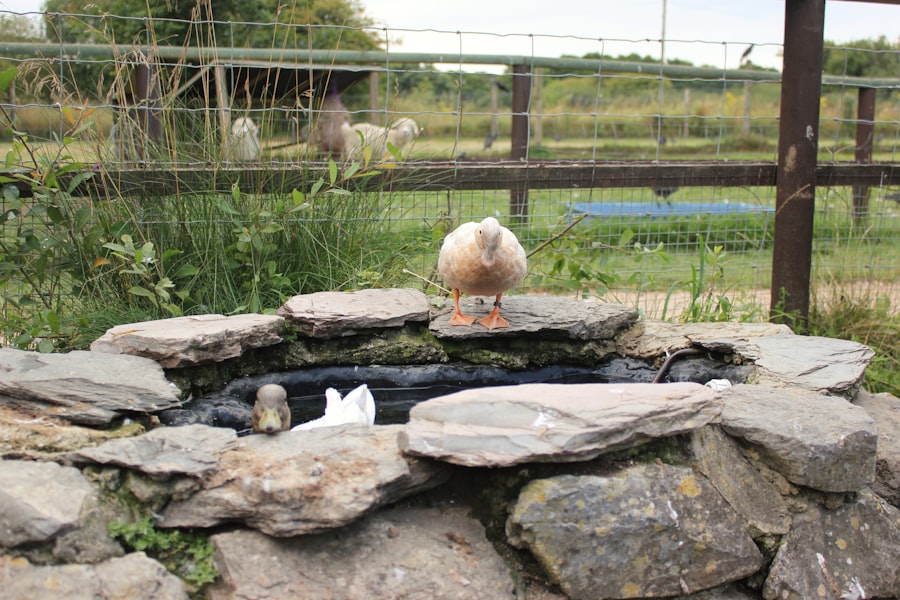
Muscovy ducks are highly valued for their meat and eggs. Muscovy duck meat is known for its lean and tender texture, making it a popular choice among chefs and food enthusiasts. It has a rich flavor that is often compared to that of beef or veal.
In terms of egg production, Muscovy ducks are not as prolific as other poultry breeds such as chickens. However, they do lay larger eggs with a rich yolk and a higher protein content. Muscovy duck eggs are often used in baking and cooking and are highly prized for their nutritional value.
To raise Muscovy ducks for meat and egg production, it is important to provide them with a balanced diet that includes a mix of grains, vegetables, and protein sources. They should also have access to fresh water at all times. It is also important to provide them with adequate space to roam and exercise, as this will contribute to their overall health and well-being.
Muscovy Ducks as Pets: Pros and Cons
Keeping Muscovy ducks as pets can be a rewarding experience, but it is important to consider the pros and cons before making the decision.
Pros of keeping Muscovy ducks as pets include their gentle temperament, low maintenance requirements, and their ability to control pests. Muscovy ducks are known for their calm and friendly nature, making them suitable for families with children or other pets. They are also relatively low maintenance compared to other poultry breeds, requiring minimal grooming and care.
Another advantage of keeping Muscovy ducks as pets is their ability to control pests such as flies and mosquitoes. Muscovy ducks have a natural instinct to forage for insects, making them an effective and eco-friendly pest control solution.
However, there are also some cons to consider when keeping Muscovy ducks as pets. One of the main challenges is their size. Muscovy ducks are one of the largest breeds of domesticated ducks, and they require ample space to roam and exercise. They also produce a significant amount of waste, which can be challenging to manage in a backyard setting.
Another potential drawback is their noise level. While Muscovy ducks do not quack like other duck breeds, they can still make noise through hissing and other vocalizations. This can be disruptive in residential areas or if you have close neighbors.
Before deciding to keep Muscovy ducks as pets, it is important to consider these factors and ensure that you have the necessary space, resources, and commitment to properly care for them.
Muscovy Duck Care and Maintenance
Proper care and maintenance are essential for the health and well-being of Muscovy ducks. Here are some important considerations:
Housing requirements: Muscovy ducks require a safe and secure housing area to protect them from predators and the elements. The housing should provide enough space for the ducks to move around comfortably and should be well-ventilated. It is also important to provide nesting boxes or areas for egg-laying.
Feeding and watering: Muscovy ducks require a balanced diet that includes a mix of grains, vegetables, and protein sources. They should also have access to fresh water at all times. It is important to provide them with clean water containers and to regularly clean and refill them.
Cleaning and maintaining their living space: Regular cleaning of the duck’s living space is essential to prevent the buildup of waste and bacteria. This includes removing droppings, replacing bedding material, and disinfecting the area as needed. It is also important to regularly check for signs of pests or disease.
Common Health Issues in Muscovy Ducks
Like any other animal, Muscovy ducks are susceptible to certain health issues. Some common health issues that affect Muscovy ducks include:
1. Respiratory infections: Muscovy ducks can develop respiratory infections, especially if they are kept in damp or poorly ventilated environments. Symptoms may include coughing, sneezing, nasal discharge, and difficulty breathing.
2. Parasites: Muscovy ducks can be affected by external parasites such as mites and lice, as well as internal parasites such as worms. Regular monitoring and treatment can help prevent infestations.
3. Botulism: Muscovy ducks are susceptible to botulism, a bacterial infection that can be fatal if left untreated. Symptoms may include weakness, paralysis, and difficulty swallowing.
To prevent and treat these health issues, it is important to provide a clean and sanitary living environment for the ducks. Regular monitoring and observation can help identify any signs of illness or distress. If necessary, consult a veterinarian who specializes in poultry to ensure proper diagnosis and treatment.
Why Muscovy Ducks are a Great Addition to Your Farm or Backyard
In conclusion, Muscovy ducks are a great addition to any farm or backyard for several reasons. They are highly valued for their meat and eggs, making them a profitable choice for those looking to raise poultry for food production. They are also known for their gentle temperament and low maintenance requirements, making them suitable for families and individuals with limited experience in raising ducks.
Muscovy ducks are also effective pest controllers, making them a valuable asset in controlling flies and mosquitoes. They are adaptable to various climates and can thrive in different environments. Additionally, Muscovy ducks have unique physical characteristics that make them visually appealing and interesting to observe.
However, it is important to consider the specific needs and requirements of Muscovy ducks before deciding to raise them. They require adequate space, proper nutrition, and regular care to ensure their health and well-being. By providing the necessary care and attention, Muscovy ducks can be a rewarding addition to any farm or backyard.
If you’re interested in learning more about different breeds of Muscovy ducks, you might also want to check out this informative article on Poultry Wizard’s website. It discusses the various characteristics and traits of Muscovy duck breeds, including their size, coloration, and temperament. You can find the article here: https://poultrywizard.com/keeping-ducks/muscovy-duck-breeds/.
FAQs
What are Muscovy ducks?
Muscovy ducks are a breed of domesticated duck that is native to South America. They are known for their unique appearance, which includes a red, fleshy face and a distinctive wattle.
What are the different breeds of Muscovy ducks?
There are several different breeds of Muscovy ducks, including the Black, Blue, Chocolate, Lavender, and White varieties. Each breed has its own unique characteristics and appearance.
What is the size of Muscovy ducks?
Muscovy ducks are typically larger than other domesticated duck breeds, with males weighing up to 12 pounds and females weighing up to 8 pounds.
What is the lifespan of Muscovy ducks?
Muscovy ducks can live for up to 8-12 years, depending on their living conditions and overall health.
What is the temperament of Muscovy ducks?
Muscovy ducks are generally docile and friendly, making them a popular choice for backyard flocks. However, males can become aggressive during breeding season, so it is important to keep them separated from females during this time.
What is the diet of Muscovy ducks?
Muscovy ducks are omnivores and will eat a variety of foods, including insects, worms, snails, and small fish. They also enjoy fruits, vegetables, and grains.
What is the purpose of raising Muscovy ducks?
Muscovy ducks are raised for their meat, eggs, and feathers. They are also popular as pets and for exhibition purposes.
Meet Walter, the feathered-friend fanatic of Florida! Nestled in the sunshine state, Walter struts through life with his feathered companions, clucking his way to happiness. With a coop that’s fancier than a five-star hotel, he’s the Don Juan of the chicken world. When he’s not teaching his hens to do the cha-cha, you’ll find him in a heated debate with his prized rooster, Sir Clucks-a-Lot. Walter’s poultry passion is no yolk; he’s the sunny-side-up guy you never knew you needed in your flock of friends!

